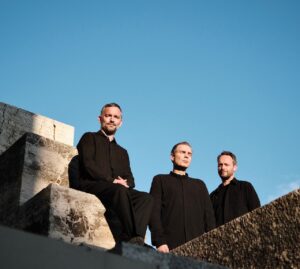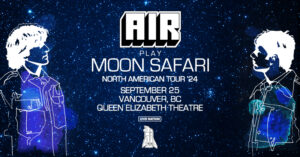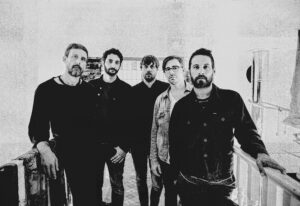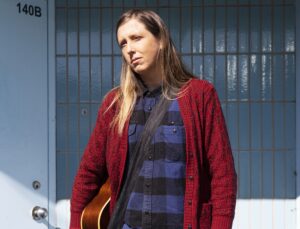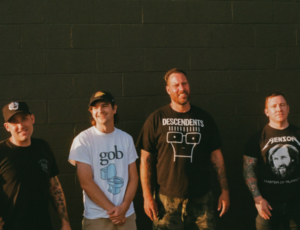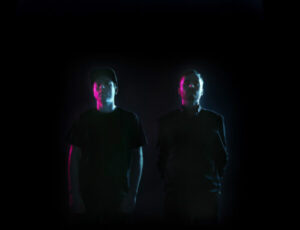It’s sound check. All four members of the group are on stage, promptly at the scheduled time, prepping for the sold out gig. Lead vocalist/bass player/self-confessed “shit-dancer”, Andy McCluskey, has shifted from comfortable banter (ideas for a new tattoo in commemoration of this tour) to a series of precise directives to the tech booth, most of which relate to the recently released single “Metroland”. The brand new tune will open the show, being performed in front of a live audience for the very first time tonight.
Paul Humphreys, co-founding member of OMD – a group that has sold over 40 million albums – invites me into the green room for a chat.
Vancouver Weekly: Welcome to Vancouver, Paul! How has your stay been so far?
Paul Humphreys: Oh, it’s excellent. I love it here! I actually have quite a few friends here, so it’s always great to visit. One of my dearest friends, actually is Douglas Coupland. I was up at his house last night. He put on a little dinner party as he knew we were coming to town, which was very sweet. It was lovely to see him. He’ll be at the show tonight as well, which is excellent.
Vancouver Weekly: Wow – and he didn’t invite me? So weird… Well, next time, I guess [laughs]. How long have you actually been in town for?
PH: Remind me of the day again? [laughs] We arrived Wednesday.
Vancouver Weekly: Because just last week, you were doing quite a bit of press, Breakfast Television, etc. on BBC…
PH: Yeah, we’ve been doing quite a bit of running around for the new record. We were just in Berlin a few days before that as well. The thing is, that we hadn’t intended to start touring so early, with the album being out, but we landed the Coachella festival – which is great – so we thought, you know, we’re freighting four tons of equipment over, so instead of just doing Coachella, we may as well do the whole of the West Coast and take in Vancouver, Seattle, and work our way down until we get to Coachella.
Vancouver Weekly: How did you come to the conclusion of Vancouver to start? How did we score this honour?
PH: Well – it’s a great town! It deserves it. [laughs] It was lucky, how it worked out, you know, there’s so many bands on the roads these days, a lot is dependent upon venue availability. We’ve played The Commodore before, many times… We actually played The Commodore in the ’80s! Goes to show you how old we are. [laughs]
Vancouver Weekly: Does the place feel different this time around?
PH: You know what? I was actually just speaking with Andy on stage, and we both walked in independently of each other, and we both thought, “This place is a lot bigger than I remember it being!” We had remembered it as a small club. It’s really not!
Vancouver Weekly: And I noticed on my way in, there’s already people gathering around outside!
PH: Yeah. The show is actually sold out.
Vancouver Weekly: Well, I bet you’ve had some really memorable shows over the last thirty or so years… What gigs stand out as favourites?
PH: You know, it’s hard to say. Although we do, remarkably, remember a lot of our gigs. But the tour with Depeche Mode for the 101 was really quite special. I remember playing the Rose Bowl in Pasadena and it was, like, 90,000 people and we walked out on stage and it hadn’t quite gone dark, and there were still lights, and you could actually see 90,000 faces – a sea of people – and it was really exciting. I walked out and there’d been a blip in the power and it had wiped all the memory off my keyboard… and then the band started up, and all I had was this sign on my keyboard, saying “This will take a while” [laughs] because it needed to be rebooted and everything. And this was old technology, these were, like, old computer keyboards. It just took forever and everyone’s looking at me! 90,000 people there and we’re just doing this sort of drum and bass thing because all my keys weren’t working. [laughs] I think the audience thought we were doing this sort of dub version of “Enola Gay”, meanwhile, the band are looking at me going – [pulls a questioning face]
Vancouver Weekly: What are you most excited about for this tour?
PH: We’re excited about playing Coachella, because it’s such a fabulous festival in a great setting. It’s going to be good – but the thing is, because we stopped for quite a long time, we’ve come back to it with renewed enthusiasm. We don’t actually “have” to be OMD anymore –
Vancouver Weekly: I know! And you definitely don’t “have” to be doing interviews anymore –
PH: Well, we’re really just having fun with it now. We’ve got a new freedom now. We’ve got freedom back, really… We lost our freedom. We started out with loads, you know, for the first four albums; even though we were signed to a major label, they gave us free rein to do whatever we wanted. But things got more and more corporate as the ’80s went on, and there was different pressures, you know, to sell certain amounts of records and to do big tours. Andy and I just got exhausted. The whole band, really, we were completely exhausted by it all. Our records got compromised, because – frankly – the well was just getting dry, the well that had all the ideas in it… We were just on the road all the time. And with a synth band, you can’t really write songs on the road. You can now, with laptops, and all that – but you couldn’t then. It was too difficult. So, we used to get home, after a nine month tour, and the record company would be there saying “Well, where’s the next album?” and we’d say, “Well, we haven’t started it yet!” and they’d literally be saying, “Well, you’ve got about two months,” and so, the first ten songs you could come up with had to be the album. The cart went before the horse in the end. It all got far too difficult, which is why we ended up stopping.
Vancouver Weekly: Taking a break from everything, including each other…
PH: Exactly. And also, the climate changed, you know, in the mid-’70s, we thought that electronic music was going to be the future. You know, it felt like we were creating the future, and we get to the mid-’90s and see that the future is actually Oasis, and Blur, and referencing the ’60s and ’70s, and we were like, “How the hell can this be the future?” and we sort of lost our place in music. Electronic music was kind of dead. We felt like we were banging our heads against a wall, and it wasn’t until the mid 2000s, really, that a lot of young bands started referencing , you know, saying that OMD was a big influence on them and there was a renewed interest in the band again, with a resurgence in electronic music. The climate for OMD to exist in has come back, so we dared to be OMD again.
Vancouver Weekly: Wow – what a great story! You must have so much history to share, and you have been so influential. Are you planning to –
PH: Most of the stories, you can’t write down though, you know? [laughs]
Vancouver Weekly: [laughs] I bet! But do you plan on having some form of massive retrospective box set with a bit of the written history?
PH: Well, we have released a box set, but it’s not one of our full catalogue. We have done a special English Electric one, but the trouble with a full catalogue box is that they’re all owned by different companies, so logistically, it’s difficult. I mean, I’m sure we can at some point, but it would take a lot of people working together for it. Logistically, it’s a nightmare. I think we’d probably do it when we finally decide to hang up our boots.
Vancouver Weekly: Which, clearly, is no time soon.
PH: Not at the moment. Not while we’re still enjoying ourselves. I mean, we have worked incredibly hard over the last couple of years, so we are going to take a bit of a break. In 2006, we sort of started up again; Andy and I just started playing with an orchestra around Europe, that was the first thing we had done together in lots of years, and we decided to just pull the whole band back together to do a one-off tour, and that was really successful, so we dared to do another tour, and that was successful, and we didn’t want to become a band that’s pastiche of ourselves – like, a tribute band playing our best hits – we have to exist as a real band, you know, as a modern band who is vibrant and active, or we stop. So we dared to make a new album with History of Modern, and it was really well received, and it was us getting the engine running again.
Vancouver Weekly: I think, critically, it was one of the best received albums you’ve had…
PH: Critically, it was amazing. Although this album [English Electric] is being really well received as well. I’ve actually just been going through a whole pile of emails from the people who it’s been getting out to in Britain, and people seem to be happy with it.
Vancouver Weekly: I’m still waiting – I’ve only heard the one single [“Metroland”]
PH: Oh have you? Well, we’re playing five tracks from it tonight, so you’ll hear some of it. I really think that History of Modern was us getting the engine running again, and now, with English Electric, we’re in top gear. We’re very pleased with this record.
Vancouver Weekly: Now, you brought up an interesting point earlier, when you said “the album company would be looking for 10 songs…” With the way that we consume music having changed so much throughout your career – you know, you’ve sold over 40 million albums and that just doesn’t happen anymore…
PH: I know… now, selling 1-2 million is considered a massive achievement!
Vancouver Weekly: So what kind of effect has that had on the music that you are creating?
PH: You know, it hasn’t really affected our music, because now, you know, we’re completely in charge of what we’re doing. We’re self-funded, more or less – though with this, BMG actually stepped in and gave us some money, but overall we have been self-funded, so we’ve got freedom. We can do whatever we want, we can make whatever we want, records that sound however we like, there’s no one that is telling us what to do. It’s like when we were kids again, starting out, no one was telling us what to do, we were creating some new things, some interesting things, and we’re really back to doing that again.
But you know, the climate – the music climate – the business is unrecognizable from when we first started out…
Vancouver Weekly: How do you gauge success nowadays?
PH: Well, it’s really very difficult to gauge success now. You can try to gauge it with sales, but money has gone completely out of the industry, and music has lost its value, basically, and you know a younger generation will spend $50 on a video game, but they won’t spend 99 cents on a song.
Vancouver Weekly: Isn’t that heartbreaking?
PH: It’s heartbreaking… the internet is both a blessing and a curse for musicians, because yes, you’ve got this great marketing tool, social media and all that, to round people up to come to your gigs, but at the same time, the internet has killed the recording industry.
Vancouver Weekly: So that idea of “I’ll grow up and be a rich pop star”…
PH: Yeah – forget it. There’s no money in it. [laughs] You’ve got to be doing it just for the love of it. But that’s the problem, you see, because musicians are becoming hobbyists. They need a day job to pay their bills! They’ve still got kids that need new shoes, and things like that. [laughs] I mean, there’s been a few tragic stories, you know, there’s a few bands that we know of – er – a band that we took under our wing, I wont say who they are, but we took them on the road – a new electric band… They made an album that I think was probably one of the best albums I’d heard in ten years, but they were signed to a little independent label, they didn’t have any of the marketing behind it, they weren’t selling any records, they couldn’t make any money on the road because no one knew who they were. They were all piling all their own money to keep the band running, and they all ended up fighting, because they’re all broke and owe everyone lots of money. They imploded and it’s such a tragedy, because they were one of the most talented bands I’d heard for quite some time, and that –
Just a few feet away, Malcolm Holmes falls into a steady drum beat. I move my iPhone to a closer table to ensure the recording will be okay.
PH: Good idea to move that – bloody drummers. [laughs] But, yeah – that was one band that I know of personally, but how many other bands all over the world is that happening to? A good band, you know, in the ’80s a record label would’ve take them under their wing and gone, “Don’t worry, guys – we’ll finance you, don’t worry about money. You get in that studio and be creative.” They were capable of having massive hits… It’s just tragic, really.
Everything has become so conservative, you know? Radio is becoming so conservative, the record labels have become very conservative. It’s like, “Well, that’s a hit! Let’s have 10 more that sound just like that.” It’s becoming like selling Coca-Cola, you know? It can be so horribly corporate. But a band like us, you know, even though we’re completely left field and away, we still do our commercial thing, but, we couldn’t exist in this climate if we weren’t already a known band. You know, we can exist as we are now, but if OMD was just starting out in this climate, we’d have no chance.
Vancouver Weekly: I’ve noticed that some of the other artists known for great albums in the ’80s, who have recent work – David Bowie and Depeche Mode, for example – many of the early reviews criticized them for lack of a stand-out hit, but –
PH: But it’s not the point! It’s not the point to have one, big song – it’s about the album. Listen to it – the whole thing. It’s the whole experience. I mean, our album – I wouldn’t exactly say it’s a concept album, references to ’70s punk rock [laughs] but there is definitely a thread that runs through it. There’s a theme that works best when you take it in as a whole. We released it on vinyl everywhere, because we want people to listen to it as an album. It’s a journey. It’s a musical journey, you know. We’re trying to say a few things about the future. The future is the thread of the album. Our mantra for the album is “what does the future sound like?” That’s what we said to each other while we were making it… and I don’t think we’ve fully answered that question, but it was an interesting question to ask. It made us think, and it sent us on this journey.
Vancouver Weekly: I noticed in the press kit that was sent out for this show, that there were words like “dystopia”, “things not turning out the way that we thought” that were used in reference to the new album…
PH: Well yeah, it’s like as I was saying before – in the mid-’70s, we thought we were creating the future and it hasn’t turned out that way; the future that we anticipated. I mean, the first song of the record, there’s a spoken computer voice saying, “The future you anticipated has been cancelled. Please wait for further instructions.” We’ll be starting with that tonight, and it kind of says it all, really. We thought, you know, in the mid-’70s, you’d think we’d get to 2013 and we’d all be in flying cars, we’d all live for 200 years, and there’d be no hunger in the world. Like, Bladerunner was set in, what, 2019? And that’s not the future either. It’s an interesting topic, you know? Where is our future going?
Simon Fuller, tour manager, politely interrupts, letting us know that a dozen or so VIP ticket holders, who are authorized to be present for the sound check are on their way in.
PH: Well, I really hope you enjoy the show tonight. We are showcasing our new album, but most of the fans want to hear our back catalogue, they want to hear those songs they are familiar with, and we’re happy to be able to give them that. You know, so many bands almost seem to be embarrassed by their hit singles and they’ll just do, like, a medley, or an acoustic version, but we like to play them as they are on the record… You know, we went to see Kraftwerk recently and, you know, Kraftwerk played the tape Modern in London, and they played a different album every night. And, Andy and I, you know, we worship them; they were the blueprint for OMD in the beginning, and we were listening to Radio Activity and they played the whole album. You know, Radio Activity is what we were listening to when we were 15, in my mum’s back room, and they played it just like it was – exactly like the album was back then. You know, some of these songs have never been played live before, and Andy and I were just, like, shaking each other, going “*gasp* We’re back in my mum’s back room!”
They’re like time capsules, you know? Songs catch a moment of your life. They’re markers in your life, and we like to play those songs for people exactly as close to the record as we can get them.
Vancouver Weekly: I can’t wait to hear. And the first single, “Metroland”, how many times has that been played in front of an audience?
PH: Tonight is the first time it’s played live! I just hope I don’t bollocks it up!! [laughs]
And no he didn’t – bollocks it up, that is. The very full house at The Commodore Ballroom enthusiastically received twenty-three tracks from OMD, including a three-part encore; passionately singing along to the songs they knew and happily following Andy McCluskey’s encouragements to “not worry about it, and just fucking dance” for the segments of the show that featured the new album (released in North America on April 9, 2013 on BMG / 100% Records).
Both McCluskey and Humphreys voices were in great form, with each bringing an enthusiasm for performance that transported the eager crowd to a time when syncopated, overhead clapping and uninhibited chant-alongs were de rigueur for a concert.
From the new album, “Night Café” and “Metroland” were both met with fervor, while “So in Love”, “Souvenir” and (my personal fave) “Forever Live and Die” were the standout performances of the night. There was very little chitchat between songs, but what was said, added a fun tone of self-effacing humour to the evening (“This next song ruined us… We used to be quite cool, until we did this,” McClusky joked before launching into “If You Leave”).
OMD is touring down the West Coast until Coachella (starts April 14 in Indio, California). To catch a show, buy the vinyl or boxed set for English Electric, visit the OMD website.



